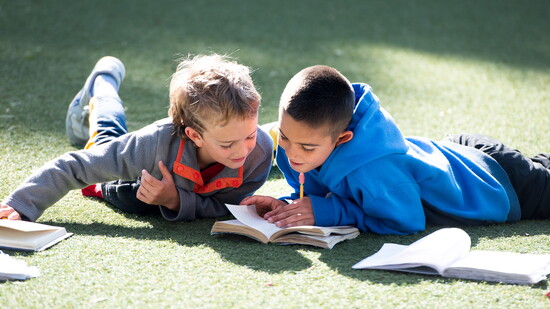Tucked into the rolling landscape of Los Olivos, Santa Ynez Valley Family School (SYVFS) is more than a classroom—it’s a living, breathing community shaped by connection, creativity, and care. Since its founding in 1974, the independent, nonprofit school has held steadfast to a vision of education that sees each child as a whole person: curious, capable, and profoundly unique.
“Santa Ynez Valley Family School was founded on the belief that education should be deeply personal, rooted in connection, and responsive to the individual needs of each child within a group setting,” says Head of School, Julianne Tullis-Thompson. “That vision continues to guide everything we do.”
That belief is woven into every aspect of the school’s structure, from the differentiated instruction to the multi-age classroom model. “At the heart of our approach is the understanding that each child is a unique individual, and our job is to help them discover how they can thrive and truly belong,” she adds.
SYV Family School’s multi-age classrooms are intentionally designed to nurture both empathy and leadership. Older students step into mentorship roles, guiding younger peers through routines, modeling respectful communication, and helping navigate both academic and social challenges. Weekly “buddy time” between classes—pairing older and younger students—deepens these connections. “These relationships grow over the year,” Tullis-Thompson explains. “It’s a simple structure with a powerful impact: students come to understand that their presence matters to someone else, and that leadership isn’t about authority—it’s about care.”
This same relational focus drives the school’s social-emotional learning program. “Each week, we introduce a new concept or skill at our K–5 Monday morning assembly,” she says. “Through read-alouds, class conversations, and teacher-led activities, these concepts are explicitly taught in age-appropriate ways.” Over time, this shared language becomes second nature.
A strong foundation in English Language Arts is another key pillar of the academic program. Early literacy instruction includes research-based phonics and decoding strategies. As students progress, they engage in structured writing workshops that emphasize both voice and form. Students learn to express original ideas clearly while developing grammar, spelling, and composition skills. By the upper grades, students write across genres and read with increasing depth, preparing them to tackle middle school with confidence.
Nature is also an integral part of the teaching at SYVFS. “Our curriculum is deeply rooted in the natural world,” says Tullis-Thompson. “Through regular hikes and science projects, students develop an ongoing relationship with their surroundings.” Activities like composting, maintaining a worm bin, or caring for a classroom pet teach ecological responsibility in hands-on ways. Even everyday lessons conducted outside—such as reading, math, and journaling—foster a quiet reverence for the land.
Extended outdoor adventures, a beloved tradition at SYVFS, offer a blend of academic inquiry and character development. “Students practice perseverance, collaboration, and self-assessment,” Tullis-Thompson explains. “They journal and create reflective art, study local ecology, and build collaborative forts that encourage problem-solving and exploration of basic engineering principles. These moments nurture creativity, resilience, and a strong sense of interdependence.”
Unstructured playtime in the school’s natural surroundings is equally important. “It offers children the freedom to process their thoughts, emotions, and social experiences in a relaxed, low-pressure environment,” Tullis-Thompson says. “Nature naturally supports self-regulation and mindfulness. That’s why our teachers are intentionally present—not to direct the play, but to support learning as it unfolds organically.” This philosophy aligns with the work of psychologist Jonathan Haidt, who emphasizes the importance of free play in developing emotionally resilient and socially capable children.
Through connection to community, nature, and themselves, children of SYV Family School not only gain knowledge but also develop resilience, curiosity, and a grounded sense of belonging that enables them to thrive in and beyond the classroom.
“Each child is seen, supported, and invited to thrive in community.”
